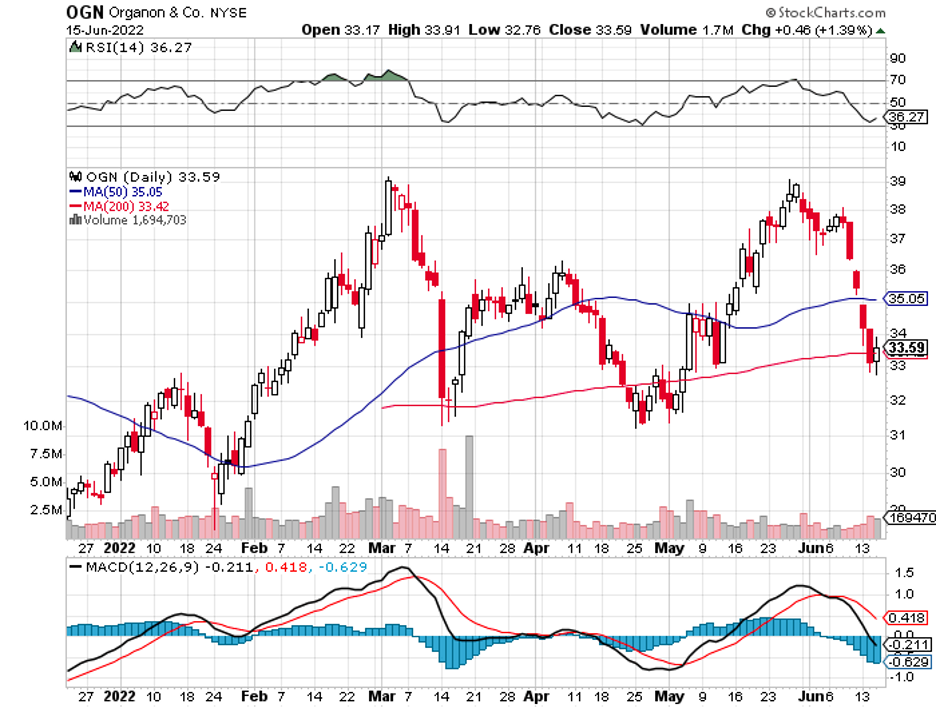An Underrated Long-Term Biopharma Stock
Six months into 2022, the markets are still in turmoil while highly valued stocks rapidly fall.
A way to cope with these is to search for safety and security among value-focused investments that are less at risk of sudden declines.
One business that remains profitable and is trading at a relatively affordable price, especially considering its future earnings multiples, is Organon (OGN).
Organon is a spinoff from Merck (MRK). It focuses on women’s health products, existing treatments, and biosimilars. It was launched roughly the same time Pfizer (PFE) launched its spinoff, Viatris (VTRS), in 2021.
While Organon has yet to become a superstar growth stock at the moment, it’s an excellent business to consider for a stable long-term investment.
So far, the company has managed to generate promising gross margins north of 60% and consistently proved to be profitable.
To date, Organon has over 60 treatments in its pipeline.
Thanks to strategic partnerships, Organon has become the biggest pharmaceutical company centered on women’s health.
Not only that, it has an extensive portfolio of biosimilars or biosimulators focusing on cardiovascular, dermatological, and respiratory conditions.
Meanwhile, Organon has one of the highest dividend yields among biopharma companies at 3.47%, with consistent dividend payments of $0.28 per share every quarter.
Organon’s biosimilar growth received a jumpstart from its agreement with Samsung Boepsis in 2013. The deal enables both companies to develop and market a number of biosimilar treatments focused on cancer and immunology.
Under this partnership, Organon has been granted exclusive license to manufacture, test clinically, and market inflammatory treatments like AbbVie’s (ABBV) top-selling Humira, Johnson & Johnson’s (JNJ) blockbuster Remicade, and Amgen’s (AMGN) moneymaking treatment Enbrel, as well as oncology therapies such as Roche’s (RHHBY) promising growth drivers Avastin and Herceptin.
These catapulted Organon as the leader in the fast-expanding healthcare field, where several lucrative drugs will lose their patent exclusivity before 2030.
Riding this momentum, Organon plans to expand its portfolio of biosimilars to cover more therapeutic fields like neuroscience, diabetes, and even ophthalmology.
To boost its portfolio, Organon has been collaborating with Shanghai’s Henlius Biotech to work on more biosimilars.
The Merck spinoff has agreed to pay $73 million upfront in addition to $30 million in milestone payments for the development of Pertuzumab, a biosimilar for Roche’s breast cancer treatment Perjeta, and Denosumab, a biosimilar of Amgen’s osteoporosis drug Prolia. Another Amgen drug, bone cancer treatment Xgeva, is included in the collaboration agreement.
For context, Amgen reported $873 million in sales for Prolia and $545 million for Xgeva in 2021, while Roche raked in $4 billion from Perjeta.
If this partnership works out, Organon and Henlius plan to move forward with a biosimilar to Bristol Myers Squibb’s (BMY) cancer drug Yervoy and its best-selling Opdivo.
While these are all exciting, it may still take some time for the biosimilars to be released to the market. Among them, the Prolia biosimilar has the most apparent timeline, potentially launching the product by 2024.
Although Organon has yet to make a splash in the biopharmaceutical market, the company holds impressive potential. So far this year, the stock has been up 15%—a performance that’s better than the S&P 500 that recorded 4% in losses over the same period.
More than that, its price is heavily discounted these days, offering investors an extra incentive to seize the opportunity to buy shares of this relatively new company in the healthcare sector.
It also has consistent revenue growth and a promising pipeline of diverse candidates with the potential to expand the company’s portfolio.
Taking all these into consideration makes Organon an underrated buy at the moment and a great candidate for long-term investors.

